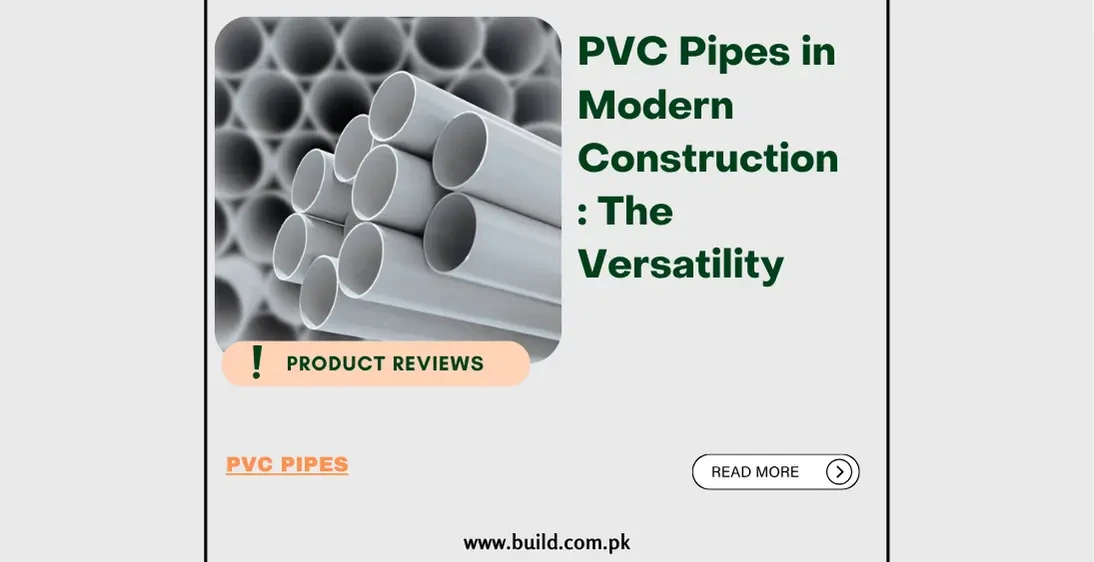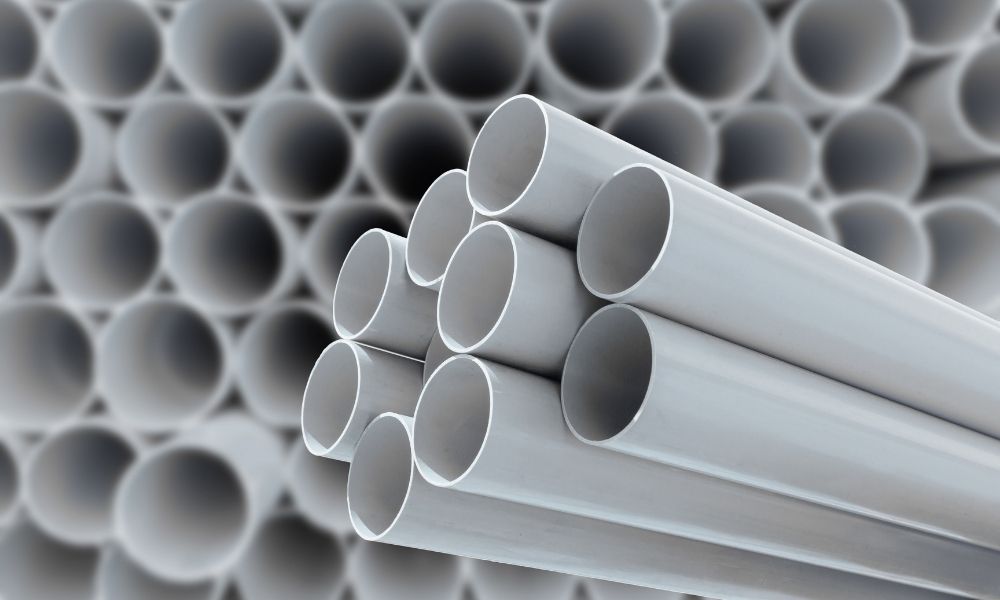PVC Pipes in Modern Construction: The Versatility

Introduction:
PVC (polyvinyl chloride) pipes are ubiquitous in modern
construction and plumbing projects, offering a range of benefits that make them
a preferred choice for various applications. From water distribution systems to
drainage, irrigation, and beyond, PVC pipes are known for their durability,
affordability, and versatility. In this detailed blog, we'll explore the
characteristics, advantages, applications, installation methods, and
environmental considerations associated with PVC pipes, highlighting why they
are a cornerstone of contemporary infrastructure development.

Characteristics of PVC Pipes
PVC pipes, crafted from a synthetic thermoplastic polymer
known as polyvinyl chloride (PVC), exhibit a remarkable combination of
properties that contribute to their widespread use in construction and plumbing
applications:
Durability:
PVC pipes are highly durable and resistant to
corrosion, abrasion, and chemical damage, making them suitable for a wide range
of indoor and outdoor applications. This durability ensures longevity and
reliability in various environments, including underground installations and
exposed conditions.
Affordability:
One of the key advantages of PVC pipes is
their cost-effectiveness compared to alternative piping materials. The
affordability of PVC pipes makes them an attractive choice for projects with
budget constraints without compromising on quality or performance.
Lightweight Construction:
PVC pipes are lightweight,
facilitating easy transportation, handling, and installation. The reduced
weight of PVC pipes translates to lower transportation costs and simplified
on-site handling, contributing to overall project efficiency and labor savings.
Versatility:
Available in a diverse range of sizes,
thicknesses, and configurations, PVC pipes offer versatility to meet specific
plumbing and construction needs. They can be tailored to fit various
applications, from residential plumbing systems to large-scale industrial
projects.
Chemical Resistance:
PVC pipes exhibit exceptional resistance
to a wide range of chemicals, acids, alkalis, and salts. This chemical
resistance ensures long-term performance and reliability in environments where
exposure to corrosive substances is a concern, such as chemical processing
plants or wastewater treatment facilities.
Smooth Interior Surface:
The smooth interior surface of PVC
pipes minimizes friction and resistance within the pipe, promoting efficient
fluid flow. This feature reduces energy consumption in pumping systems and
helps prevent clogs and blockages, enhancing overall system performance and
efficiency.
Advantages of PVC Pipes
PVC pipes offer a multitude of advantages that make them a
preferred choice for various applications in the construction and plumbing
industries:
Longevity:
PVC pipes have a proven track record of longevity
and durability, with a service life that can exceed several decades. Their
resistance to corrosion and degradation ensures minimal maintenance
requirements and reduced lifecycle costs over time.
Corrosion Resistance:
Unlike metal pipes, PVC pipes are
inherently resistant to rust and corrosion, making them ideal for water
distribution systems, sewer lines, and other applications where exposure to
moisture and chemicals is common.
Ease of Installation:
PVC pipes are lightweight and easy to
cut, join, and install using simple tools and techniques. This ease of
installation reduces labor costs and project timelines, making PVC pipes a
preferred choice for rapid and efficient plumbing installations.
Chemical Resilience:
PVC pipes can withstand exposure to a
diverse range of chemicals without experiencing degradation or loss of
performance. This chemical resilience makes them suitable for industrial
applications where resistance to corrosive substances is critical.
Insulation Properties:
PVC pipes provide effective thermal
insulation, helping to maintain the temperature of transported fluids. This
insulation capability is beneficial in applications where temperature control
is important, such as HVAC systems or hot water distribution.
Environmental Benefits:
PVC pipes are recyclable and contribute
to energy savings during production and transportation. They have a lower
carbon footprint compared to alternative materials like metal or concrete,
making them a sustainable choice for environmentally conscious projects.
Applications of PVC Pipes
PVC pipes are utilized in a wide range of construction and
plumbing applications across various industries:
Water Supply Systems:
PVC pipes are commonly used for potable
water distribution due to their safety, durability, and resistance to
corrosion. They are suitable for both residential and commercial water supply
systems.
Drainage and Sewer Systems:
PVC pipes excel in wastewater
removal and sewer line installations, offering superior resistance to chemical
and biological degradation. They are a reliable choice for underground sewer
networks and drainage systems.
Irrigation Systems:
PVC pipes play a crucial role in
agricultural irrigation systems, efficiently transporting water to crops. Their
durability and chemical resistance make them ideal for irrigation applications
in agricultural settings.
Electrical Conduit:
PVC pipes serve as protective conduits
for electrical wiring, providing insulation and safeguarding against moisture,
corrosion, and physical damage. They are commonly used in residential,
commercial, and industrial electrical installations.
HVAC Systems:
PVC pipes are essential components of heating,
ventilation, and air conditioning (HVAC) systems, facilitating the efficient
conveyance of air and fluids within buildings. They help optimize HVAC
performance and energy efficiency.
Installation Methods
PVC pipes can be installed using various methods tailored to
specific project requirements:
Solvent Cementing:
This common method involves bonding PVC
pipes using solvent cement, creating secure, leak-proof connections that
withstand internal pressures and environmental stresses. Solvent cementing is
ideal for permanent joints in plumbing systems.
Threaded Connections:
PVC pipes can be equipped with threaded
adapters and fittings, allowing for disassembly and reassembly in applications
requiring flexibility or maintenance access. Threaded connections are suitable
for applications where frequent adjustments may be necessary.
Mechanical Joints:
Mechanical couplings and fittings enable
quick and easy assembly of PVC pipes without the need for solvent cement. Mechanical
joints provide versatility and convenience, allowing for efficient installation
and reconfiguration of plumbing systems.
Environmental Considerations
While PVC pipes offer numerous advantages, it's important to
consider their environmental impact and sustainability:
Recyclability:
PVC pipes are recyclable and can be repurposed
into new products, minimizing waste and reducing environmental impact. Proper
disposal and recycling of PVC pipes contribute to resource conservation and
circular economy practices.
Energy Efficiency:
PVC pipe production consumes less energy
compared to traditional materials like metal or concrete, resulting in lower
carbon emissions and energy savings. This energy efficiency makes PVC pipes a
sustainable choice for infrastructure projects.
Chemical Emissions:
Proper disposal and recycling of PVC pipes are essential to prevent harmful chemical emissions during incineration. Responsible waste management practices ensure environmental protection and safety.
Conclusion:
PVC pipes are a versatile and reliable solution for modern construction and plumbing applications, offering durability, affordability, and ease of installation. By understanding the characteristics, advantages, applications, installation methods, and environmental considerations discussed in this blog, contractors, engineers, and homeowners can leverage the benefits of PVC pipes to achieve efficient and sustainable infrastructure development. Whether you're planning a new water distribution system, sewer installation, or irrigation project, PVC pipes provide a cost-effective and dependable solution that meets the demands of today's construction industry while minimizing environmental impact.









